Decapeptyl Injection: Empowering Hormonal Health with Precision and Strength
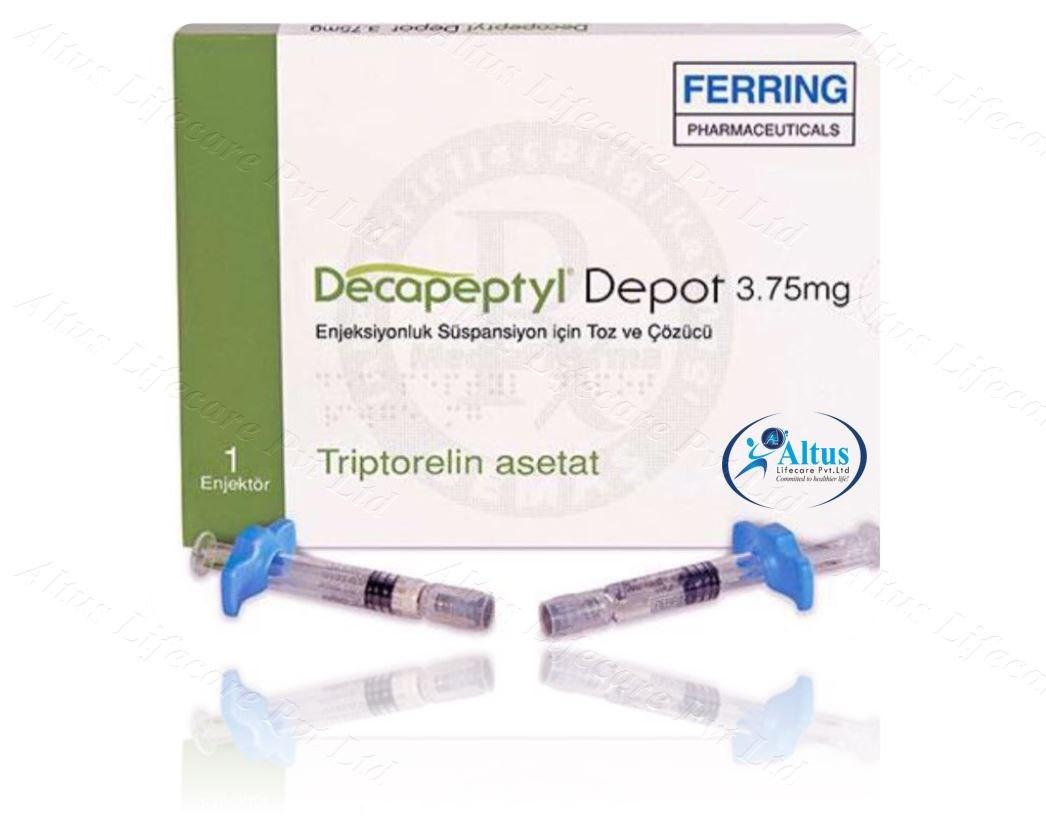
Decapeptyl Injection: Precision Therapy, Powerful Relief
Quick Summary Introduction
Decapeptyl Injection has emerged as a highly trusted and effective treatment in the management of hormone-sensitive conditions, including advanced prostate cancer, endometriosis, uterine fibroids, and infertility. With its powerful formulation containing Triptorelin, a synthetic gonadotropin-releasing hormone (GnRH) agonist, Decapeptyl has truly revolutionized hormone modulation therapy. Whether administered in monthly or extended-release forms, it offers patients a reliable and controlled solution to hormonal disorders that once posed significant health challenges.
What sets Decapeptyl apart is its ability to precisely control hormone levels, thereby alleviating disease progression and improving quality of life. Thanks to its predictable pharmacokinetics, ease of use, and broad applicability across multiple indications, Decapeptyl has become a gold-standard therapy in reproductive and oncological endocrinology. Let’s explore this remarkable injection in depth, including its benefits, usage, safety, and mechanism of action.
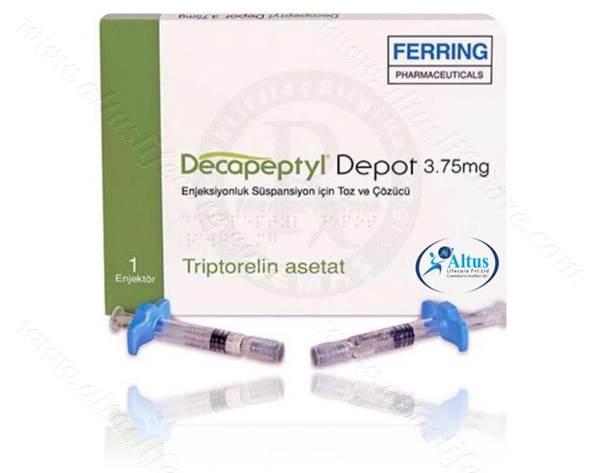
Table of Contents
- Introduction to Decapeptyl Injection
- Composition and Dosage Forms
- Mechanism of Action: How Decapeptyl Works
- Indications and Medical Uses
- Clinical Benefits and Effectiveness
- Administration and Dosage Guidelines
- Safety Profile and Side Effects
- Comparisons with Other Hormonal Therapies
- Patient Experience and Compliance
- Storage and Handling Instructions
- Availability and Market Acceptance
- Final Thoughts: A Hormonal Ally You Can Trust
- Frequently Asked Questions (FAQ)
1. Introduction to Decapeptyl Injection
Decapeptyl is a brand name for Triptorelin, a synthetic analogue of the natural gonadotropin-releasing hormone (GnRH). It is used to regulate hormonal imbalances, particularly in conditions that are hormone-dependent. Manufactured under strict pharmaceutical standards, Decapeptyl offers consistent and reproducible results, making it a vital part of endocrine and reproductive treatment regimens across the globe.
It works by initially stimulating and then significantly reducing the secretion of sex hormones like testosterone and estrogen, which is particularly useful in managing diseases such as prostate cancer, endometriosis, and precocious puberty. Because of its well-validated mechanism and enduring results, Decapeptyl enjoys widespread clinical endorsement.
2. Composition and Dosage Forms
Decapeptyl Injection comes in several dosage forms to meet a variety of therapeutic needs:
- Decapeptyl 0.1 mg/day (daily administration)
- Decapeptyl 3.75 mg (1-month formulation)
- Decapeptyl 11.25 mg (3-month formulation)
- Decapeptyl 22.5 mg (6-month formulation)
Each vial contains Triptorelin pamoate or Triptorelin acetate, depending on the brand variant. It is usually supplied as a powder that must be reconstituted with a provided diluent before intramuscular or subcutaneous injection.
3. Mechanism of Action: How Decapeptyl Works
Understanding how Decapeptyl Injection exerts its therapeutic effects begins with a close look at its active ingredient—Triptorelin. This synthetic peptide belongs to a class of medications known as gonadotropin-releasing hormone (GnRH) agonists. Although its name may sound complex, the science behind it is both elegant and highly effective.
A Hormone-Based Precision Tool
Under normal physiological conditions, the hypothalamus—a small region in the brain—secretes GnRH in pulsatile bursts. These pulses travel to the anterior pituitary gland, prompting it to release two other essential hormones: luteinizing hormone (LH) and follicle-stimulating hormone (FSH). These gonadotropins are responsible for stimulating the testes in males to produce testosterone and the ovaries in females to produce estrogen and progesterone.
However, in hormone-dependent conditions like prostate cancer, endometriosis, and uterine fibroids, this hormonal stimulation exacerbates the disease. That’s where Decapeptyl comes in.
Initial Surge: The "Flare-Up" Phase
When a patient first receives a Decapeptyl injection, Triptorelin initially mimics natural GnRH. This results in a temporary increase in the levels of LH and FSH. Consequently, there is a brief surge in sex hormone production—testosterone in men and estrogen in women. This phenomenon, often referred to as the "flare effect", typically lasts for about a week.
Although it may sound counterintuitive, this short-lived hormone spike is not harmful and is a known pharmacodynamic feature of all GnRH agonists. In some cases—particularly in patients with prostate cancer—doctors may prescribe anti-androgens during this initial phase to block the effects of the temporary testosterone surge and avoid symptom exacerbation.
Sustained Suppression: The Desensitization Phase
After the flare phase, continuous exposure to Triptorelin leads to downregulation of GnRH receptors on the pituitary gland. In simple terms, the pituitary becomes desensitized to the drug, and its ability to produce LH and FSH gradually diminishes. As a result, the levels of sex hormones fall drastically—effectively mimicking a state of menopause in women or castration in men.
This suppression is highly beneficial in several clinical scenarios:
- In prostate cancer, reduced testosterone starves the cancer cells, slowing tumor growth.
- In endometriosis and fibroids, lower estrogen levels shrink the ectopic endometrial tissue or fibroid mass and reduce inflammation.
- In assisted reproductive treatments (ART), it provides tight control over the hormonal environment, allowing physicians to precisely time ovulation.
- In precocious puberty, Decapeptyl halts the premature release of sex hormones, thereby delaying the onset of puberty.
Chemical Castration—But Reversible and Controlled
One of Decapeptyl's most impressive features is its ability to induce a reversible state of hormone suppression. Unlike surgical castration or permanent menopause, the effects of Decapeptyl wear off once the injections are discontinued. Over time, the pituitary regains its sensitivity, and hormone production resumes. This is crucial for patients undergoing temporary therapy, especially in fertility-related treatments.
Depot Formulations and Consistent Hormone Control
Decapeptyl is available in various depot formulations—monthly (3.75 mg), three-monthly (11.25 mg), and six-monthly (22.5 mg)—that ensure a steady release of Triptorelin over the dosing interval. These long-acting versions offer:
- Sustained hormone suppression with a single injection
- Improved patient compliance
- Minimized fluctuations in hormone levels
This precision makes Decapeptyl not only effective but also highly predictable, a key trait in the management of hormone-sensitive diseases.
A Versatile and Trusted Mechanism
The mechanism of action of Decapeptyl is a brilliant example of how medical science can manipulate natural hormone pathways for therapeutic benefit. By harnessing the body’s own feedback systems, Decapeptyl manages to control complex endocrine conditions in a minimally invasive yet highly effective manner.
In summary, Decapeptyl works by:
- Mimicking natural GnRH to initially stimulate hormone production
- Desensitizing the pituitary to suppress LH and FSH release
- Dramatically lowering sex hormone levels over time
- Reversibly inducing a controlled hypo-hormonal state
This layered and well-orchestrated mechanism gives Decapeptyl its broad-spectrum clinical applicability, ensuring it remains a staple in hormonal therapies for both men and women.
4. Indications and Medical Uses
Decapeptyl Injection is indicated in a variety of hormonal conditions:
In Men:
- Advanced and metastatic prostate cancer: Decapeptyl effectively reduces testosterone to castrate levels, slowing tumor progression.
In Women:
- Endometriosis: By reducing estrogen, Decapeptyl helps relieve pain and shrink endometrial tissue.
- Uterine fibroids: Often used before surgery to reduce fibroid size and bleeding.
- Assisted reproductive technologies (ART): To suppress natural hormone production before ovarian stimulation.
In Children:
- Precocious puberty: It halts premature sexual development by suppressing LH and FSH.
Its versatility across age groups and genders highlights its pivotal role in hormonal medicine.
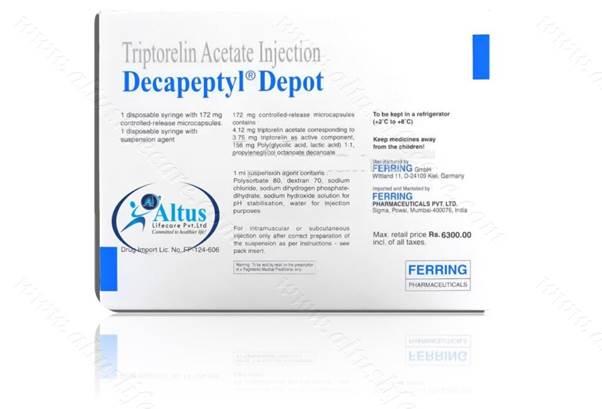
5. Clinical Benefits and Effectiveness
The benefits of Decapeptyl Injection are clinically well-documented:
- Long-term symptom relief in endometriosis and prostate cancer
- Tumor size reduction and disease control
- Minimized need for surgical interventions
- Better fertility outcomes in ART procedures
- Non-invasive management of precocious puberty
Patients typically notice symptom relief within 2–4 weeks of initiating therapy. Long-acting formulations allow for less frequent dosing, which boosts patient compliance and convenience.
6. Administration and Dosage Guidelines
Decapeptyl is administered via intramuscular (IM) or subcutaneous (SC) injection by a trained healthcare provider. Dosage varies by condition:
- Prostate cancer: Decapeptyl 3.75 mg every month or 11.25 mg every 3 months
- Endometriosis/Uterine fibroids: Monthly injection for up to 6 months
- Fertility treatments: Decapeptyl 0.1 mg daily as part of ovarian stimulation protocol
- Precocious puberty: Monthly to quarterly injections based on response
Strict medical supervision is necessary to tailor treatment duration and monitor therapeutic outcomes.
7. Safety Profile and Side Effects
While Decapeptyl is generally well-tolerated, some patients may experience transient side effects, particularly during the initial flare phase. Commonly reported reactions include:
- Hot flashes
- Headaches
- Decreased libido
- Mood swings
- Injection site discomfort
Rare but notable adverse effects include bone mineral loss, vaginal dryness, or emotional disturbances. These are typically dose-dependent and reversible upon discontinuation. Supplementation with calcium and vitamin D is often recommended during prolonged use in women.
8. Comparisons with Other Hormonal Therapies
Compared to other GnRH agonists like Leuprolide or Goserelin, Decapeptyl has:
- A longer half-life
- Lower frequency of administration (especially the 3- and 6-month depots)
- Comparable or superior efficacy in suppressing gonadotropin release
- Easier handling and reconstitution
Moreover, studies suggest Decapeptyl is particularly effective in controlling hormone levels without significant breakthrough activity, giving it an edge in long-term therapeutic planning.
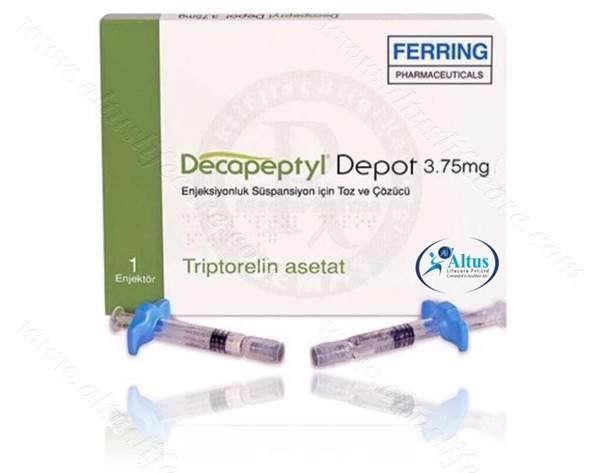
9. Patient Experience and Compliance
Patient satisfaction with Decapeptyl is high, thanks to its:
- Reduced injection frequency
- Consistent hormone suppression
- Proven symptom relief
Most users report improved quality of life after just a few weeks of therapy. Counseling prior to therapy and ongoing support ensures smooth adaptation to hormonal changes, especially in fertility and oncology patients.
10. Storage and Handling Instructions
Decapeptyl must be stored in a refrigerator at 2°C to 8°C and protected from light. The reconstituted solution should be used immediately. Healthcare providers must follow proper sterile technique to prevent contamination and ensure patient safety.
11. Availability and Market Acceptance
Decapeptyl is widely available under various international labels and is approved by several major health authorities, including the FDA, EMA, and CDSCO (India). Its usage in public and private healthcare institutions has seen a steady rise, driven by clinical efficacy and patient trust.
Pharmaceutical companies manufacturing Decapeptyl ensure GMP-certified production standards, and the product is distributed in both generic and branded forms globally.
12. Final Thoughts: A Hormonal Ally You Can Trust
In conclusion, Decapeptyl Injection stands tall as a beacon of hope for patients suffering from hormone-driven disorders. With its precise mechanism, long-acting relief, and proven safety, Decapeptyl brings balance and control to conditions that were once difficult to manage. Whether you're addressing chronic pelvic pain from endometriosis, preventing cancer progression, or supporting fertility, this powerful hormonal ally delivers results.
Choosing Decapeptyl means choosing clinical reliability, patient convenience, and lasting improvement—a combination that makes it truly exceptional.
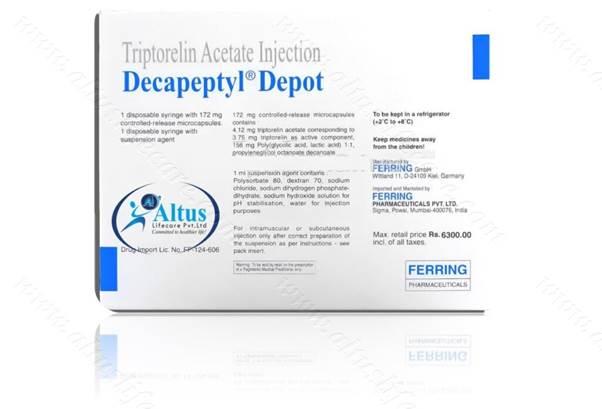
13. Frequently Asked Questions (FAQ)
Q1. How long does it take for Decapeptyl to start working?
Most patients begin experiencing symptom relief within 2 to 4 weeks of the first injection. Full hormone suppression typically occurs by the end of the first month.
Q2. Is Decapeptyl safe for long-term use?
Yes, but long-term use should be carefully monitored by a healthcare provider. Supplementation for bone health and regular follow-ups are recommended for extended therapies.
Q3. Can Decapeptyl affect fertility?
Yes. It suppresses hormonal signals needed for ovulation and sperm production. However, it is often used in IVF protocols to optimize fertility by controlling hormone timing.
Q4. What should I do if I miss a dose?
Contact your healthcare provider immediately. Timely administration is critical to maintaining therapeutic hormone suppression.
Q5. Are there any dietary restrictions while using Decapeptyl?
No specific dietary restrictions are required, but maintaining a balanced diet rich in calcium and vitamin D is advisable, especially in long-term treatments.
Q6. Is Decapeptyl covered by insurance?
In many countries, Decapeptyl is covered under health insurance plans for approved indications such as prostate cancer or endometriosis. Check with your provider for specific details.
Q7. Can children take Decapeptyl?
Yes, it is approved for treating central precocious puberty in children under pediatric supervision.
Buy Online from: Decapeptyl Depot Injection (Triptorelin 3.75mg) - Altus Lifecare Pvt Ltd
- Art
- Causes
- Crafts
- Dance
- Drinks
- Film
- Fitness
- Food
- Games
- Gardening
- Health
- Home
- Literature
- Music
- Networking
- Other
- Party
- Religion
- Shopping
- Sports
- Theater
- Wellness
